Posts published by “centaur”
- Dinner: Whole Foods to-go sushi and tabbouleh. What can I say? Yum.
- TV: Doctor Who: Survival. Not so yum. The last serial aired from the original series. I wish I hadn't seen it; outside an extraordinary career-ending performance by Anthony Ainley as the Master, it was one of the silliest and most nonsensical Sylvester McCoy episodes ever. What was the Master doing on the Cheetah planet? Why is it called the Cheetah planet in the first place? And how did the Doctor get back?
Back to my regularly scheduled sniffling, coughing, and bleary attempts to write code...
“Sooo…” she said, still staring across the aisle. “What brings you to San Francisco?”
“Oh, hell,” I said, leaning back in the chair. I felt the baby in the seat behind me reach at my Mohawk, grabbing a thread of purple before her mother pulled her back. “I’ve got quite the agenda, but mostly … negotiating with people to establish some new rules for magic.”
“Rules for magic?” Granola Girl asked, brow furrowing. “Really?”
“Well, that, some other, uh, business, plus taking my daughter to colleges—”
“Go back to the rules for magic bit,” Granola Girl said—and no, really, I’m not making fun of her; she ordered yogurt-and-granola on the flight out. “Magic isn’t just ‘more than the sum of its parts;’ it transcends the parts that invoke it. You can’t reduce magic to something less than what it is. If you start putting rules on magic—a tabu on mana—you’ll cripple it.”
I let out my breath. I’d heard all this before. Heck, I had to break all the rules I knew just to start practicing magic. But to keep practicing magic, you had to be really careful, or it would kill you. And recently, I’d found that it could kill other people too.
Reading it I can already see things I want to fix. Not now. Must press onward.
-the Centaur
Completion. A wonderful feeling.
-the Centaur
Meanwhile, Warren Ellis is fighting as many deadlines as I am while also writing a seven-volume epic mashup called War and Peace of the Worlds featuring the entire cast of Archie Comics turned gritty postmodern superheroes, is doing it all one handed on his Palm Pilot while using the other to lean on his cane as he climbs Mount Everest after having coughed up a lung ... and is still blogging three times a day.
@!$%##?!
-the Centaur
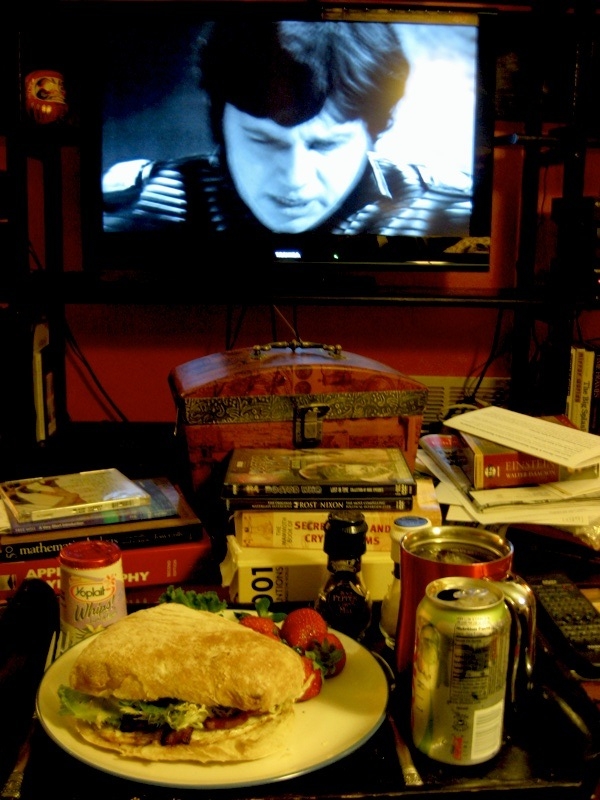
From the Doctor Who - Lost In Time DVD Set: Enemy of the World, a bit cheesy in parts but proving that Doctor Who can handle intrigue, Patrick Troughton can indeed act like two completely different persons, and Jaime McCrimmon (pictured) can be written as sharp and resourceful rather than a complete idiot. Overall, the Lost in Time collection both shows both the creaking corners of the old Doctor Whos as well as stunning moments when the show was just "on", as sharp or sharper as anything on the air today. Hint: almost anything involving the Daleks usually has a nice, tangy metal edge.
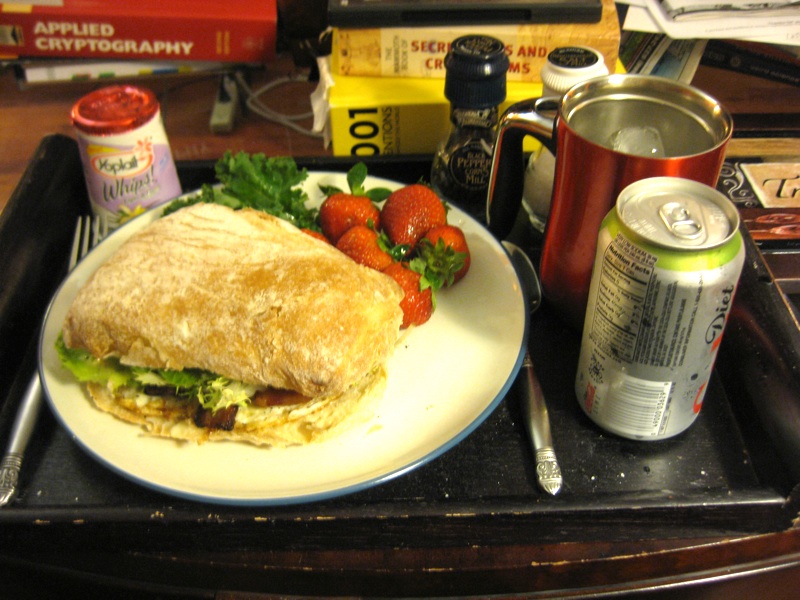
From wichcraft restaurant's cookbook of the same name, a bacon and egg sandwich with olive oil / red wine vinegar tossed frisee on a split ciabatta roll toasted on the inside with a thin layer of gorgonzola cheese, proving that you can make a sandwich into a gourmet meal. And that I don't particularly like gorgonzola, but that's not the fault of the sandwich; it actually went quite well with the rest of it.
-the Centaur
Anonymous has left a new comment on your post "Why I Write":
I can not participate now in discussion - it is very occupied. I will be released - I will necessarily express the opinion. [url=DELETED]acheter levitra[/url] This rather good idea is necessary just by the way
Publish this comment.
Reject this comment.
Moderate comments for this blog.
The deleted URL is to a French eBay site, "acheter levitra" is French for "buy Levitra," which is a brand name of Vardenafil, which is, of course, a Viagra clone. So this is essentially random pseudo-English text with a "buy Viagra" link, depending on the 1% of people who click on such links and the 1% of people who buy to pay for the cost of putting this spam on my blog. Charming.
Comment reeejected.
-the Centaur
UPDATE: I got a similar post of with a less obvious spam form, targeting one of the more popular pages on my blog (can you say pooound cake?):
"I found this site using [url=http://google.com]google.com[/url] And i want to thank you for your work. You have done really very good site. Great work, great site! Thank you! Sorry for offtopic"
But the [url=XXX]TEXT[/url] pattern was a dead giveaway. A search on Google for ["[url=http://google.com]google.com[/url]"] - note that's the '[url.../url]' thing in double quotes; the outermost brackets are the syntax you use to indicate a chunk of text is a query, like [centaur] - SO anyway, a search on Google for that nonsense revealed that the exact text of that comment has appeared elsewhere. So this is just more comment spam, trying to see if comments are unmoderated here.
Comment flattering! But reeejected.
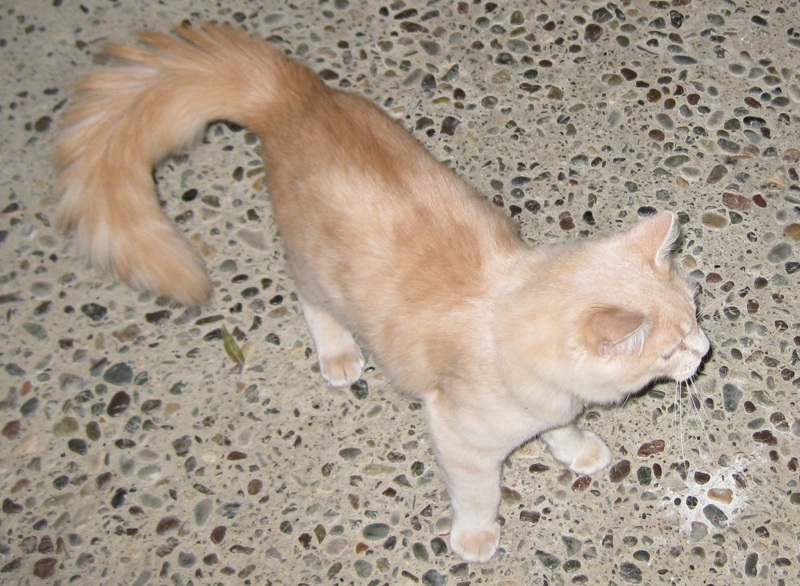
Once we were traveling the neighborhood late and found a small and collarless cat alone by the sidewalk. Near him, on the lawn, half crouched another cat lay, who froze then turned tail, disappearing in the cold night. Know that the stray cat well our passions read; it yet survives, became not some lifeless thing, but found hands that pet him and hearts that fed. And upon this doorstep these thoughts we hear:
My name is Gabby, Cat of Cats. Listen to my purrs, ye mighty tall people, and despair of anything but bringing me home and giving me can food and vaccinations!Nothing else remains of that stray cat, all ribcage and scared, but a full belly and warm and level purrs that stretch far away.
-the Centaur, after Shelley.
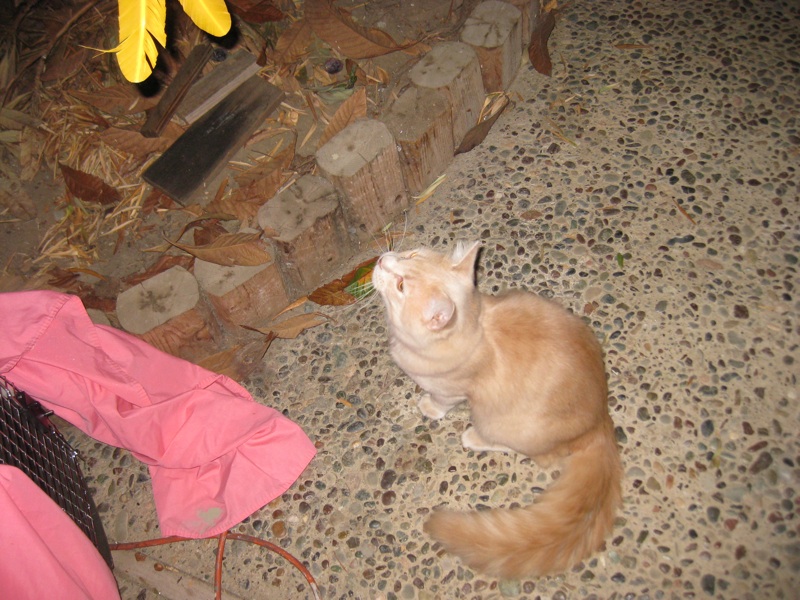
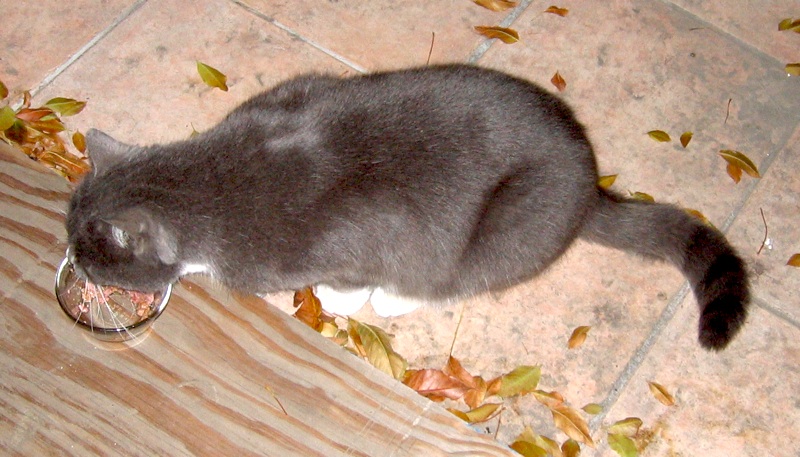 So we have cats. Three, currently - Caesar, a rescue cat, Lenora, a shelter cat and Gabby, a stray cat - out of a lifetime population of five, including Nero, the brother of the rescue cat, who disappeared (probably eaten by coyotes), and Graycat, another stray cat, pictured, who we unfortunately had to have executed by the state (because only I could handle him, using gloves, and we were afraid he was going to come knife us in our sleep).
So we have cats. Three, currently - Caesar, a rescue cat, Lenora, a shelter cat and Gabby, a stray cat - out of a lifetime population of five, including Nero, the brother of the rescue cat, who disappeared (probably eaten by coyotes), and Graycat, another stray cat, pictured, who we unfortunately had to have executed by the state (because only I could handle him, using gloves, and we were afraid he was going to come knife us in our sleep).So the three remaining cats are somewhat finicky. There are foods they will love, foods they will grudgingly eat, food they will eat but puke up, and food they will (quite literally) try to bury as if it is crap. So I've been meaning for a long time to keep up a diary of the food choices and their reactions to find out what we can feed them.
Data mining researchers claim that getting high-quality input data is the hardest part of a machine learning problem, so I started off with some exploratory data collection in Excel. After letting (thoroughly washed!) cans pile up for a week in two bins, I entered these into a spreadsheet and started to figure out how the data should be represented. I ended up with these columns:
- Brand: Fancy Feast, Nutro, etc.
- Type: Regular, Max Cat Gourmet Classics, etc.
- Flavor: Savory Salmon Feast, White Meat Chicken Florentine with Garden Greens, etc.
- Consistency: Flaked, Pate, Grilled, etc.
- Target: Adult or Kitten
- Package: Can, Tray or Packet
- Ratings: +1 or -1
After collecting this data, I started to analyze it. First I sorted the data. Then I eliminated duplicates and added a Servings, AggregateRating and Average column, summing up the Ratings into the Aggregate so that if something got two +1 and one -1 rating it would get 3 Servings and a AggregateRating of 2. This I used to compute an Average, which I used to resort the table to see which brands worked best.
The problem is, this Average wasn't that meaningful. One vote for a flavor isn't as meaningful as three, because the cats aren't consistent. This is the inverse of the Law of Large Numbers: you need many ratings to generate a meaningful result in the presence of noise.
I decided to set the number of ratings I cared about at 3, based on anecdotal comments by Roger Schank, my thesis advisor's thesis advisor - who reportedly said you need to visit a restaurant three times to give it a fair rating, because a restaurant could have one off day or great day and you needed at least 3 ratings to get an idea of their consistency.
At first I decided to track this using a smoothed average, AggregateRatings / (Servings + 3), but this depressed the all-positive and all-negative scores more than I liked - that kind of smoothing function works only well if you have very large ranges of values. So I chose a simpler max-based approach of AggregateRatings / Max(Servings, 3), so that one serving would get a 33% positive or negative rating but three or more could max it out to 100% if they were consistent.
That enabled me to make some findings, but then I realized I'm an idiot. I'd picked up the smoothed average idea from Empirical Methods for Artificial Intelligence, a book any serious computer scientist should read. And I'd edited my data in the spreadsheet so I could compute that average. But what I should have been thinking about was The Pragmatic Programmer, specifically the tips Keep Knowledge In Plain Text and Use Source Control.
Why Keep Knowledge In Plain Text? The cats aren't just finicky; their tastes change, especially if you overfeed them one thing. So the date at which a cat turns on food is important. By entering it into Excel, I first had to have a computer on hand, which encouraged to let the cans pile up; so I lost both the date information and some of the rating information - a coarse grained +1/-1 rather than "Ate Instantly"/"Ate Completely"/"Left Unfinished"/"Refused or Puked Up"/"Tried to Bury". A superior strategy would have been a pen-and-paper notebook where I recorded the cans a few hours after they were eaten. This could be entered into a text file a few days later, and if it is tab or comma separated Excel could easily import it. Then, with that data, I could even have applied other techniques from Empirical Methods for Artificial Intelligence, like using a sliding time-series window to ensure I'm analyzing the cat's current tastes.
And why Use Source Control? Because I edited my Excel file, dummy, not even versioned with v1 v2 v3 like I do with documents. So I actually entered this data in two phases and some of the temporal information I could have recovered has been lost.
So I'm going to improve my procedures going forward. Nevertheless, I did get some nice preliminary data, which jibes well with the observations Sandi and I had made informally. I'm going to hold judgment until I have more data, but so far Fancy Feast is the best brand, and Cod, Sole and Shrimp Feast and Savory Salmon Feast are the winningest flavors. Newman's Own Organics and Halo Spot's Stew were the worst brands - the cats refused to even touch them - which is odd, because Newman's Own makes great human food (try Newman O's) and Halo makes great dry food the cats love.
More results as the votes continue to trickle in...
-the Centaur
So, for the month of November, when I'm supposed to be writing 50,000 words of Liquid Fire ... I will blog once a day. So far, so good ... 3 days, 3 posts. Here's to committment - meh.
-the Centaur
What is life? No scientist can tell you. Oh, the pocket-protector variety will say that living things move, eat and grow, wrapped up in ten-dollar words like ‘locomotion’ and ‘intake’ and ‘self-organization’. But these by themselves are not life: a waterfall moves more vibrantly than any animal, a fire eats more efficiently, a crystal is more organized.As usual, I have a theme, plot, and know almost exactly how it will end. But more than the previous two books in the series, I feel like I'm stepping off into a great void, even though the magic of this book - firespinning - is an art I myself perform, unlike the tattoos featured in Frost Moon (of which I have none) and the graffiti featured in Blood Rock (of which I have done none). All I have to go on this one are love, fire ... and the nightmares from the Hadean.
A worldly scientist, aware of the dance of the sexes, will mention the heat of metabolism, the fire of reproduction. But a fire eats to live just like we do, but faster: and where we breed in a slow dance of desire, a fire lives in a hot orgy of giving, casting off its own substance, flying sparks, glowing seeds, drifting through the air to start the cycle again. If metabolizing and reproducing were all there were to life, would not fire be alive?
But life is not any one of these things: life is all of them together. It is the combination of moving and eating and organizing, of metabolism and reproduction, of a thousand things more. Put them all together, and you get more than you started with: a holistic — holy — combination that is more than the sum of its parts. Life is magic.
Or more precisely, magic is life.
Wish me luck.
-the Centaur

Recently, work was getting more hectic and family matters required more travel, and I was getting frustrated going out to coffeehouses and delis just to get wireless Internet. So, signed up for an AT&T; wireless data plan, complete with a little dongle by Sierra Wireless that actually does the job of connecting to the Internet.
I refused to get the two year contract just so I could get the dongle for free, because I was burned this time last year getting a two year contract just so I could get a cheap smartphone ... right before the Search Engine That Starts With A G bought all of its employees Android smartphones.
SO I opted to instead to pay month to month, and as a consequence I had to pony up two hundred dollars for that little dongle. Because of the monthly fee, and how the math worked out, I stupidly did not spend the extra $5 bucks a month insuring the damn thing.
I say stupidly, because I left it in my pocket and put my pants in the wash.
My heart fell when I saw the cap of the dongle tumble out as I was emptying the clotheswasher. Sure enough, I found the dongle in the pocket of a pair of pants. Sadly, I took it to my Mac and plugged it in. The lights flickered for a moment, but did not come on. Just to be sure, since the Mac's two USB ports are not equivalent, I switched it to the other side.
The lights flickered ... and then the power light turned blue, while the connection light turned red. Hoping against hope, I hit "Connect" on the Sierra Wireless Watcher control panel. The connection light began flashing ... and a minute later, it connected.
Since I knew that liquid in electronic devices can sometimes cause problems down the road, I disconnected it, unplugged it, and put it front of a spaceheater to dry out more thoroughly, then a fan to cool it off. One day later, I'm writing this blog entry using this same dongle, and it's doing fine.
Go Sierra, and go AT&T; for picking a quality parts supplier.
-the Centaur




